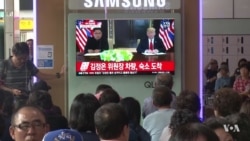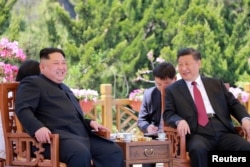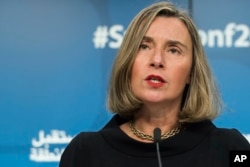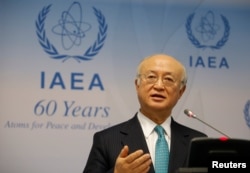Major leaders across Asia and the world mostly voiced approval for Tuesday's agreement between U.S. President Donald Trump and North Korean leader Kim Jong Un to push toward ending Pyongyang's nuclear weapons program, even as South Korea and others adopted a more cautious stance.
South Korean President Moon Jae-in said he told Trump in a phone call that the Singapore summit pact laid down a "big framework" for peace on the Korean peninsula and across the globe.
WATCH: S. Koreans React with Joy, Concern to summit
But Seoul's presidential office said it was still trying to understand Trump's decision to end joint U.S.-South Korean military exercises, long an irritant to North Korea.
Trump announced at a news conference he was terminating the war games and said it would "save us a tremendous amount of money." But the Seoul-Washington drills were not mentioned in the document that Trump and Kim signed.
The next set of exercises were set for August, but Seoul's Defense Ministry said, "At this current point, there is a need to discern the exact meaning and intent of President Trump's comments," adding that there had been no discussions with Washington about the war games. Trump labeled them as "inappropriate" as North Korea moves toward denuclearization.
Chinese Foreign Minister Wang Yi said, "The United States and North Korea have been in a state of antagonism for more than half a century. Today, that the two countries' highest leaders can sit together and have equal talks has important and positive meaning, and is creating a new history."
Japanese Prime Minister Shinzo Abe welcomed Kim's approval of a commitment to complete denuclearization. The Japanese leader thanked Trump for raising the issue of North Korea's abduction of Japanese nationals with Kim and said that "Japan will deal firmly with North Korea face-to-face" on the issue.
European reactions
Russia's Foreign Ministry said the "normalization of American-North Korean relations... is an integral part" of resolving "the problems of the Korean peninsula, including the nuclear one." But Konstantin Kosachev, chairman of the foreign affairs committee in the upper house of the Russian parliament said that Trump's claim that denuclearization of North Korea will start soon is "more of a wish than a fact."
European Union foreign policy chief Federica Mogherini said, "This summit was a crucial and necessary step to build upon the positive developments achieved in inter-Korean relations."
She said the ultimate goal remains the same: "complete, verifiable and irreversible denuclearization." She said the summit statement "gives a clear signal that this goal can be achieved."
British Foreign Secretary Boris Johnson called the Trump-Kim summit "an important step towards the stability of a region vital to global economic growth."
Johnson said Kim's pledge of denuclearization of the Korean peninsula is a signal that he "may have finally heeded the message that only a change of course can bring a secure and prosperous future to the people of North Korea. There is much work still to be done, and we hope Kim continues to negotiate in good faith towards complete, verifiable and irreversible denuclearization."
The head of the United Nations watchdog agency, director general Yukiya Amano, said his agency "stands ready to undertake any verification (of denuclearization) activities" in North Korea as the Kim regime winds down its weapons program.
Iran appeared to be alone in questioning the validity of the signed Trump-Kim pact, with a Tehran spokesman claiming that Trump could nullify any agreement.
"We are facing a man who revokes his signature while abroad," the semi-official Fars news agency quoted Mohammad Bagher as saying, referring to Trump's renunciation of a communique at last weekend's G-7 economic summit after he had left the gathering of world leaders in Canada.













